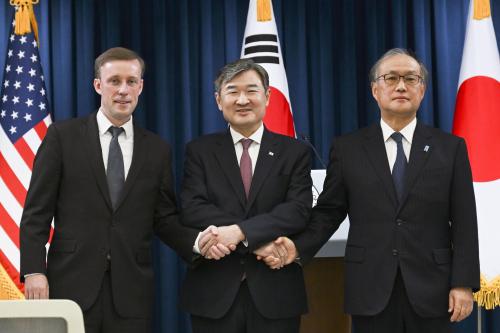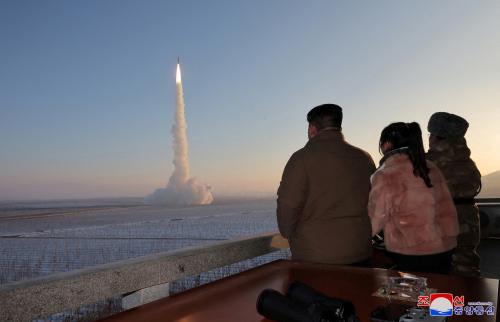What are North Korea’s strategic intentions? And what would be the costs of a military conflict on the Korean Peninsula if diplomacy were to fail? These and related issues were the topic of discussion at Brookings on March 13, when the Center for East Asia Policy Studies hosted a public discussion with experts. Below are some of the key takeaways.
Revisiting North Korea’s strategic intentions
In light of North Korea’s diplomatic overtures, experts analyzed the probable drivers behind Kim Jong-un’s decision to engage with the United States and South Korea. Panelists generally agreed that international sanctions restricting the regime’s access to foreign capital and the increased potential for armed conflict are two salient factors motivating North Korea’s outreach. Abraham Denmark, director of the Asia Program at the Wilson Center, argues that there might be another reason:
Jung Pak, senior fellow and chair in Korea Studies at the Brookings Institution, suggests that domestic factors could also be driving Kim Jong-un’s calculus, as this year marks the 70th anniversary of the country’s founding:
In regards to the proposed summit between President Trump and Kim Jong-un, Pak raised the dual concern of a potential clash or chemistry between the two leaders. In other words, a clash of personalities would make it difficult for future diplomacy and potentially reignite regional tension. On the other hand, there could be personal chemistry between the two leaders, which Kim could use as an opportunity to tap into and exploit President Trump’s existing suspicion about alliances and burden-sharing. If the two leaders do end up getting along and reach some form of agreement to denuclearize North Korea, Sue Mi Terry, senior fellow at the Center for Strategic and International Studies (CSIS), cautioned what North Korea might ask of Washington in return:
Panelists noted that summits typically take place after months of prior negotiations through working-level meetings, and expressed concern about the potential outcomes. Denmark, however, suggests that the United States “flip the script” with this top-to-bottom approach as President Obama did with former Russian President Medvedev back in 2009 on the New START arms control treaty:
Given the range of views about North Korea’s ambitions, we asked the panelists to provide their views on what North Korea is ultimately trying to achieve. While it is impossible for outside observers to clearly articulate North Korea’s strategic goals, Pak stressed the need to consider all options and believes it is still possible to alter Kim Jong-un’s calculus through policies. At the same time, Bruce Klingner, senior research fellow at the Heritage Foundation, rejected the notion that North Korea’s nuclear weapons are for “benign defense” and pointed to a number of offensive qualities the regime’s military has undertaken since Kim Jong-un assumed leadership:
Assessing the costs of a military conflict on the Korean Peninsula
Experts also provided a thorough and sobering assessment of the economic, humanitarian, political, and logistical costs of a military conflict on the Korean peninsula. Speaking on the economic impacts of a military conflict, Scott Seaman of the Eurasia Group said he expected to see massive trade disruptions and the collapse of major supply chains that will result in a significant recession around the world:
A more dire consequence of any military action would be the effect on South Korea’s population of 51 million people, including some 240,000 U.S. citizens living in Seoul. Roberta Cohen, co-chair emeritus at the Committee for Human Rights in North Korea, warned that even a conventional artillery retaliation against Seoul from North Korea would kill and injure hundreds of thousands due to the high population density in the nation’s capital. Moreover, she asserts that no amount of shelter, food, medicine, and gas masks could fully shield a civilian population under direct military attack. In light of the ongoing humanitarian crisis inside North Korea, Cohen raised the U.S. military’s obligation to protect civilians from hostilities and the need for military strategists to coordinate with international humanitarian actors to avoid inflicting casualties on civilians and prisoners who already suffer from the worst malnutrition, disease, and abuse in the country:
Mara Karlin, nonresident senior fellow at Brookings, discussed the logistical challenges that the U.S. military must address when devising a strategy against North Korea. Broadly speaking, Karlin believes that a military situation on the Korean peninsula will be far larger in scope than any of the wars that the United States has engaged in during the past 16 years, and suggested that the current number of overseas U.S. troops in the region is insufficient for such a scenario. Karlin also raised the list of strategic challenges that the Pentagon will have to consider when defining its operational goals:
Finally, Laura Rosenberger—senior fellow at the German Marshall Fund—outlined the geopolitical costs of the United States engaging in a war with North Korea. Rosenberger emphasized that any U.S.-led military strike against North Korea would likely divide the international community, whose support is essential to any real approach to dealing with North Korea. Most importantly, South Korea must agree to any form of U.S. military action: Not only does South Korea have the most at stake, but also because a U.S. military strike without South Korea’s consent would, in essence, accomplish North Korea’s goal of decoupling the alliance. Such a unilateral U.S. move would severely damage its future standing with allies and undermine the U.S. role as a force for stability in the region, all during a time when China and Russia are trying to assert greater leadership. Rosenberger reminded us to keep the focus on North Korea as the aggressor and to not create greater space for our adversaries:
For everything Brookings experts are saying on North Korea, click here.


Commentary
Unpacking the unthinkable: Experts discuss North Korea scenarios
April 26, 2018